Review Final Exam PDF

| Title | Review Final Exam |
|---|---|
| Author | Bao Nguyen |
| Course | English Composition I |
| Institution | Georgia Perimeter College |
| Pages | 5 |
| File Size | 110.9 KB |
| File Type | |
| Total Downloads | 45 |
| Total Views | 124 |
Summary
The review summarizes the second half of the course....
Description
FINAL EXAM PCO 1020 Note-taking Critical thinking Goal setting
Fit: fit values, character, who you are as a person
Ownership: must be your goal, not someone else’s goal for you.
Concreteness: be real & be able to describe in detail
Usefulness: serve a purpose & tie to your long-term vision
Stretch: offer a chance to grow beyond the person who you currently are
Your goals should include both short- and long-term goals Study strategies How many hours do you need to study per credit hours in a course For each hour you spend in class, you should schedule at least two hours of study time outside of class. Learning styles (VARK assessment) Def: characteristics and preferred ways of gathering, interpreting, organizing, recalling, and thinking about information.
Visual (look): charts & graphs
Aural (listen): discuss with friends
Read/Write:
Kinesthetic: actually do it
VARK help you discover alternative, more productive ways to learn. Be familiar with the use of the Holland Code, Myer-Briggs Type Indicator, and Kolb Inventory
MBTI: shows you your preferences in four areas
E or I What energizes you and where do you direct energy? Do you get energy from other people (Extravert) or do you go within yourself to find strength (Introvert)? S or N How do you gather information and what kind of information do you trust? Do you trust your senses and factually based information (Sensor) or do you trust your gut feelings (iNtuition)? T or F How do you make decisions, arrive at conclusions, and make judgments? Do you think things through logically (Thinker) or do you care about how others react and feel (Feeler)? J or P How do you relate to the outer world? Do you prefer organization and structure (Judging) or do you like spontaneity and going with the flow (Perceiver)?
Holland Code: 6 personality types
-
Realistic (Doers): independent, stable
-
Investigative (Thinkers): curious, methodical, rational
-
Artistic (Creators)
-
Social (Helpers)
-
Enterprising (Persuaders): extroverted, optimistic,
-
Conventional (Organizers): logical, detail-oriented
What information affects one’s credit history/credit score Credit history is based on -
How many credit cards you owe money on
-
How much money you owe
-
How many late payments you make
Credit card fees
-
annual fees (a fee you must pay every year to use the card)
-
finance charges (a charge for loaning you the money you can't pay back when your bill is due)
-
late fees (for missing a monthly payment deadline)
Time management strategies Time management = Manage time + Manage attention (+ energy, behavior, attitudes, you) Attention management: focus your attention on a designated ability -> produce a desired result. Time-saving tips -
A plan for study sessions, include suggested time limits
-
Understand your patterns -> be able to control
-
Turn off cell phone, tell others you don’t want to be disturbed
-
Work offline on computer whenever possible
-
Take 2 min to organize workplaces before beginning. Have resources at fingertips
-
Focus. Avoid multitasking
-
Use physical countdown timer. Optimum amount of time to focus: 40’ (30’ to get in gear + 10’ optimal productivity)
-
Monitor how your life works
4 kinds of problematic time management -
The preemptive: continuously ahead of the game -> non-team players, like boss
-
The people pleaser: sabotage own effectiveness by trying to make others happy.
-
The perfectionist: make into ideal that they never reach -> control freaks, anxiety-ridden lives.
-
The procrastinator
10 procrastination busters -
Keep track (of your excuses)
-
Break down: break projects into smaller components
-
Trick yourself: pick some easy aspects whenever you feel like procrastinating
-
Resolve issues: take care of things that make it difficult to concentrate
-
Get real: set realistic goals
-
Capture killer B’s:
-
Make a deal with yourself
-
Overcome fear
-
Get tough
-
Acknowledge accomplishment
Plagiarism Information literacy Cultural literacy Career vs. job A career is different from a job. It’s a profession you've chosen and prepared for. Perhaps you've had more than a string of jobs, and your career is well underway. Wellness and the effects of stress **The purposes of understanding college resources: Make sure that you are aware of the purposes of the Center for Disability, Advising, Counseling, and Retention Services, Dean of Student Services, and Student Life (search the Perimeter College website for information). Office of the Registrar: dropping courses
Advisor: how well you are doing in a class Learning Center: struggling with math courses Office of Admissions/Office of the Registrar: transfer credits Counseling Center: help to balance school, work, and personal life Multiple Intelligences -
Linguistic Intelligence: word smart
-
Logical-mathematical Intelligence: number/reasoning smart (cause-effect relationship)
-
Spatial Intelligence: picture smart
-
Bodily-Kinesthetic Intel. (CC): body smart
-
Musical Intel.: music smart
-
Interpersonal Intel. (CC): people smart
-
Intrapersonal Intel. (CC): self smart
-
Naturalistic Intel.: nature smart
Metacognition: thinking about your thinking & learning about your learning Triage: making decisions about priorities Grit: a willingness to commit to long-term goals and to persist in the face of difficulty. Focus learning system: challenge -> reaction -> insight -> action...
Similar Free PDFs

Chem Final Exam Review
- 12 Pages

Final Exam - Review notes
- 92 Pages

Bio Final Exam Review
- 2 Pages
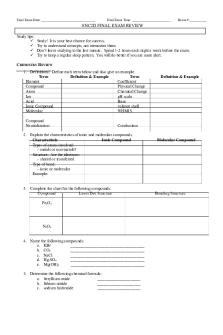
Final EXAM Review booklet
- 5 Pages
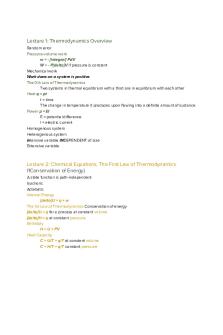
CHEM303 final exam review
- 4 Pages
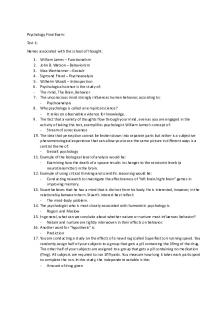
Psychology Final Exam - Review
- 13 Pages
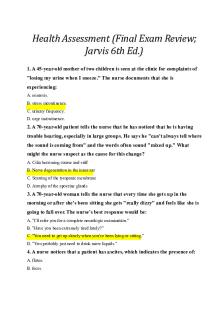
Jarvis Final Exam Review
- 12 Pages
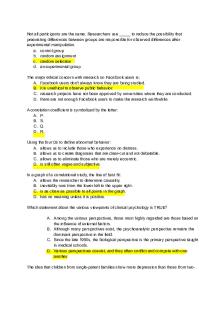
Final exam review
- 96 Pages
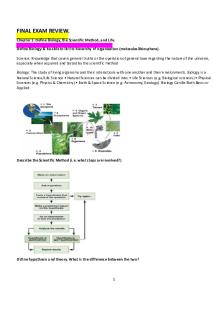
Final Exam Review
- 48 Pages
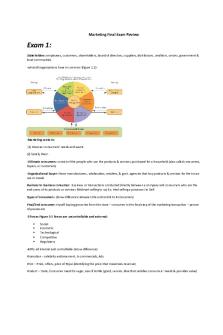
Marketing Final Exam Review
- 15 Pages
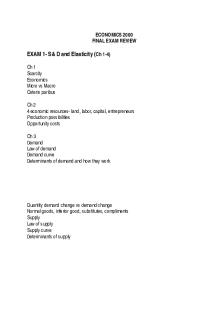
Final exam review
- 8 Pages
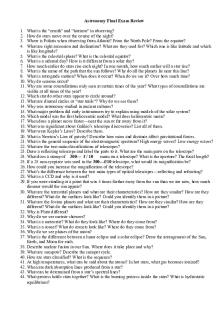
Astronomy Final Exam Review
- 2 Pages
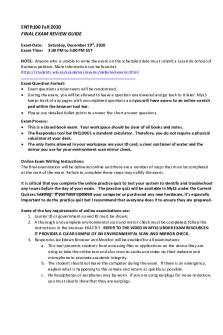
Final Exam Review Guide
- 4 Pages

Final exam review flsp4420
- 5 Pages

Theo Final Exam Review
- 16 Pages

Entrepreneurship final exam review
- 33 Pages
Popular Institutions
- Tinajero National High School - Annex
- Politeknik Caltex Riau
- Yokohama City University
- SGT University
- University of Al-Qadisiyah
- Divine Word College of Vigan
- Techniek College Rotterdam
- Universidade de Santiago
- Universiti Teknologi MARA Cawangan Johor Kampus Pasir Gudang
- Poltekkes Kemenkes Yogyakarta
- Baguio City National High School
- Colegio san marcos
- preparatoria uno
- Centro de Bachillerato Tecnológico Industrial y de Servicios No. 107
- Dalian Maritime University
- Quang Trung Secondary School
- Colegio Tecnológico en Informática
- Corporación Regional de Educación Superior
- Grupo CEDVA
- Dar Al Uloom University
- Centro de Estudios Preuniversitarios de la Universidad Nacional de Ingeniería
- 上智大学
- Aakash International School, Nuna Majara
- San Felipe Neri Catholic School
- Kang Chiao International School - New Taipei City
- Misamis Occidental National High School
- Institución Educativa Escuela Normal Juan Ladrilleros
- Kolehiyo ng Pantukan
- Batanes State College
- Instituto Continental
- Sekolah Menengah Kejuruan Kesehatan Kaltara (Tarakan)
- Colegio de La Inmaculada Concepcion - Cebu